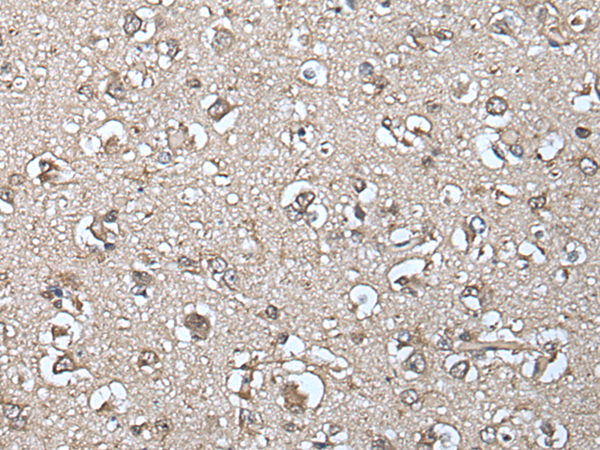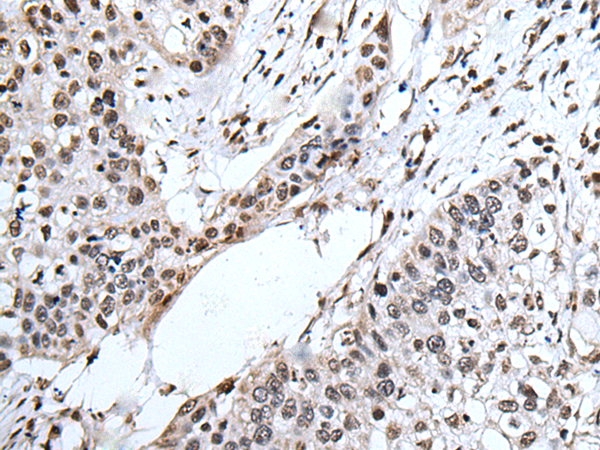

| WB | 咨询技术 | Human,Mouse,Rat |
| IF | 咨询技术 | Human,Mouse,Rat |
| IHC | 1/30-1/150 | Human,Mouse,Rat |
| ICC | 技术咨询 | Human,Mouse,Rat |
| FCM | 咨询技术 | Human,Mouse,Rat |
| Elisa | 1/2000-1/5000 | Human,Mouse,Rat |
| Aliases | MUM1; LSIRF; SHEP8; NF-EM5 |
| Host/Isotype | Rabbit IgG |
| Antibody Type | Primary antibody |
| Storage | Store at 4°C short term. Aliquot and store at -20°C long term. Avoid freeze/thaw cycles. |
| Species Reactivity | Human, Mouse |
| Immunogen | Fusion protein of human IRF4 |
| Formulation | Purified antibody in PBS with 0.05% sodium azide and 50% glycerol. |
+ +
以下是关于IRF4抗体的3篇参考文献示例(文献名称、作者及摘要概括):
---
1. **文献名称**:*"IRF4 in immune responses and cancer: A multifunctional regulator"*
**作者**:Häcker, H., et al.
**摘要**:该综述总结了IRF4在免疫调节中的核心作用,包括其在B细胞、T细胞分化中的功能,以及异常表达与淋巴瘤等癌症的关联。研究强调了IRF4抗体在解析其分子机制及靶向治疗中的潜在应用。
---
2. **文献名称**:*"IRF4 ablation suppresses multiple sclerosis pathology by inhibiting Th17 cell-mediated inflammation"*
**作者**:Chen, X., et al.
**摘要**:通过小鼠模型研究,发现IRF4抗体阻断或基因敲除可显著抑制Th17细胞活性,减轻实验性自身免疫性脑脊髓炎(EAE)症状,提示IRF4抗体在治疗多发性硬化症等自身免疫疾病中的潜力。
---
3. **文献名称**:*"IRF4 as a diagnostic marker in diffuse large B-cell lymphoma"*
**作者**:Boiocchi, L., et al.
**摘要**:研究验证了IRF4抗体在淋巴瘤病理诊断中的特异性,发现IRF4高表达与特定亚型(如活化B细胞型DLBCL)相关,支持其作为分型及预后评估的生物标志物。
---
4. **文献名称**:*"Targeting IRF4 in cancer immunotherapy: A novel antibody-based strategy"*
**作者**:Wang, Y., et al.
**摘要**:开发了一种人源化IRF4单克隆抗体,体外实验显示其可抑制肿瘤细胞增殖并增强T细胞抗肿瘤活性,为IRF4高表达癌症(如多发性骨髓瘤)提供了新型免疫治疗思路。
---
**注**:以上文献为示例,实际引用时需核对具体来源及准确性,建议通过PubMed或专业数据库(如Nature、Blood期刊)检索最新研究。
The interferon regulatory factor 4 (IRF4) antibody is a crucial tool for studying the role of IRF4. a transcription factor belonging to the IRF family. IRF4 is primarily expressed in immune cells, including B cells, T cells, and plasma cells, where it regulates lymphocyte development, differentiation, and immune response modulation. It binds to DNA either alone or in complexes with other transcription factors (e.g., PU.1) to control genes involved in apoptosis, proliferation, and cytokine signaling. Dysregulation of IRF4 is implicated in pathologies such as lymphoid malignancies (e.g., multiple myeloma, diffuse large B-cell lymphoma), autoimmune diseases, and melanoma.
IRF4 antibodies are widely used in research to detect IRF4 expression via techniques like Western blotting, immunohistochemistry (IHC), and flow cytometry. They help identify IRF4’s involvement in oncogenesis, particularly its overexpression in certain cancers, and its role in maintaining plasma cell identity. Clinically, IRF4 antibodies aid in diagnosing IRF4-driven large B-cell lymphoma and monitoring disease progression. Recent studies also explore IRF4 as a potential therapeutic target, given its dual role as both a tumor suppressor and promoter in different contexts. However, challenges remain in understanding its context-dependent mechanisms and therapeutic applicability.
×